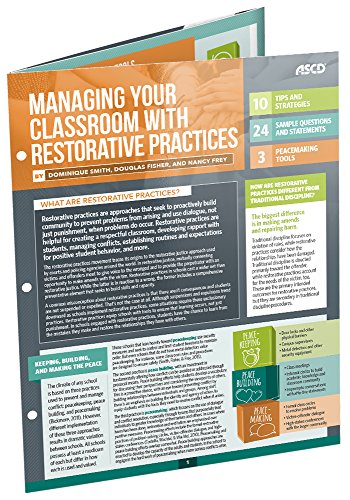Managing Your Classroom with Restorative Practices (Quick Reference Guide)
Dominique Smith; Douglas Fisher; Nancy Frey
BOOK REVIEW

In the increasingly complex landscape of modern education, where every classroom is a microcosm of society's struggles, Managing Your Classroom with Restorative Practices emerges as a transformative beacon. Authored by the dynamic trio of Dominique Smith, Douglas Fisher, and Nancy Frey, this concise guide distills powerful philosophies into actionable strategies for educators looking to create nurturing and inclusive environments. 🌍✨️
Why does this matter? Because every single day, thousands of teachers grapple with behavioral issues that disrupt learning and breed despair. In an age where punitive discipline often reigns supreme, the authors deftly advocate for restorative practices-approaches that emphasize empathy, community, and accountability. They challenge educators to rethink traditional methods, to consider not just the "what" of discipline, but the "why" behind a student's behavior. This isn't just a guide; it's a clarion call for compassion in our classrooms.
What sets this book apart lies not only in its content but also in its delivery. At just six pages, it's a quick reference but packs an emotional punch. The authors condense the philosophy of restorative practices into a digestible format that feels less like an academic treatise and more like a heartfelt conversation among colleagues. Their intent is clear: create an atmosphere where students feel seen and heard, where conflict is approached as an opportunity for growth rather than a failure. 🌱💪
Critics might argue that such restorative approaches risk undermining accountability. However, this is a misunderstanding that the authors dismantle with finesse. They present a compelling case demonstrating that restorative practices are not about excusing behavior but about understanding it-inviting students to take ownership of their actions and encouraging them to evolve. This shift in perspective has the power to revolutionize our approach to discipline.
The book doesn't shy away from real-world applications. Imagine standing at the chalkboard, surrounded by a sea of diverse faces. You've just witnessed a clash between two students. Instead of calling for a punitive response, you remember the principles outlined in this guide. What follows is a restorative circle where feelings are expressed, perspectives shared, and pathways to reconciliation forged. Can you feel the tension lifting? That's the power of restorative practices-transforming conflict into connection, fostering resilience, and building community.
Reader opinions reflect a blend of thoughtful praise and critical discourse. Many educators resonate with the authors' call to empathy, finding themselves invigorated and inspired to breathe new life into their classrooms. They share personal stories of transformed student interactions and renewed classroom dynamics that make you think, "If I don't adopt these practices, am I doing my students a disservice?" Yet, some skeptics question the practicality of implementing such methods in high-stakes environments. They wonder: can restorative practices truly take root in schools under relentless pressure to perform?
This juxtaposition only deepens the conversation. It prompts you to reflect: amidst standardized testing and rigid curricula, how can educators maintain integrity and compassion in their approach? The authors implicitly challenge you to grapple with these dilemmas, to engage with your community, and to become an agent of change. 😲❤️
Historically, the rise of restorative practices aligns with a broader movement toward social justice in education. As societal conversations around equity, inclusion, and mental health gain momentum, Smith, Fisher, and Frey's work not only fits snugly within this narrative but propels it forward. They add an essential voice to the conversation about how we handle conflict-not just in schools but in society at large. It calls us to remember: every action has a ripple effect.
And so, what's the takeaway? This guide is not merely a reference; it's an invitation to embark on a journey of transformation-one that honors the intricate tapestry of student lives while reshaping the very essence of classroom management. As you dive into Managing Your Classroom with Restorative Practices, you'll find yourself emboldened to cultivate environments where every voice matters. Are you ready to answer that call? 🔊🌈
In a world where division often seems overwhelming, this book empowers you to be a force for connection and understanding. Dive in, and witness the change unfold-not only in your classroom but in the broader community. Because, after all, education is about so much more than just imparting knowledge; it's about fostering humanity.
📖 Managing Your Classroom with Restorative Practices (Quick Reference Guide)
✍ by Dominique Smith; Douglas Fisher; Nancy Frey
🧾 6 pages
2017
#managing #your #classroom #with #restorative #practices #quick #reference #guide #dominique #smith #DominiqueSmith #douglas #fisher #DouglasFisher #nancy #frey #NancyFrey